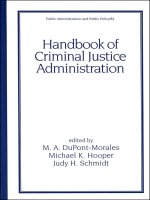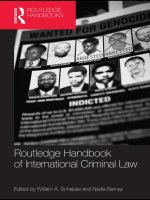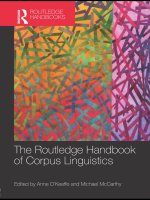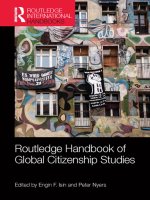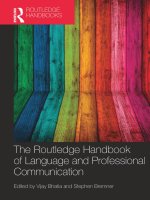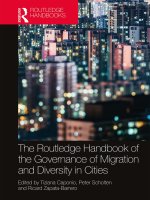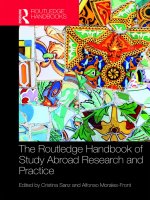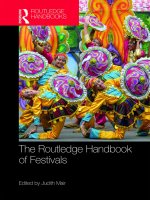Routledge handbook of climate justice
Bạn đang xem bản rút gọn của tài liệu. Xem và tải ngay bản đầy đủ của tài liệu tại đây (4.97 MB, 567 trang )
Routledge Handbook
of Climate Justice
The term “climate justice” began to gain traction in the late 1990s following a wide range
of activities by social and environmental justice movements that emerged in response to the
operations of the fossil fuel industry and, later, to what their members saw as the failed global
climate governance model that became so transparent at COP15 in Copenhagen. The term
continues to gain momentum in discussions around sustainable development, climate change,
mitigation and adaptation, and has been slowly making its way into the world of international
and national policy. However, the connections between these remain unestablished.
Addressing the need for a comprehensive and integrated reference compendium, the Routledge
Handbook of Climate Justice provides students, academics and professionals with a valuable insight
into this fast-growing field. Drawing together a multidisciplinary range of authors from the
Global North and South, this Handbook addresses some of the most salient topics in current
climate justice research, including just transition, urban climate justice and public engagement,
in addition to the field’s more traditional focus on gender, international governance and climate
ethics. With an emphasis on facilitating learning based on cutting-edge specialised climate
justice research and application, each chapter draws from the most recent sources, real-world
best practices and tutored reflections on the strategic dimensions of climate justice and its related
disciplines.
The Routledge Handbook of Climate Justice will be essential reading for students and scholars, as
well as being a vital reference tool for those practically engaged in the field.
Tahseen Jafry is a Professor at Glasgow Caledonian University (GCU), Scotland, UK and the
Director of GCU’s Centre for Climate Justice.
“Climate justice names the central problem – and solution – for this century and beyond. In this
collection, you will learn why this is and, in these still-early stages of thinking and CJ movementbuilding, which debates are raging.”
Patrick Bond, Distinguished Professor of Political Economy,
University of the Witwatersrand, Johannesburg
“This Handbook is a timely and significant contribution to the growing body of academic literature on climate justice. It comes at a critical turning point in UNFCCC climate negotiations
with the imminent review of the Paris Agreement. It is an excellent knowledge resource bound
to be of particular interest to academics, practitioners and students engaged in the field of climate
change and climate justice.”
Mary Robinson, President, Mary Robinson Foundation – Climate Justice
Routledge Handbook
of Climate Justice
Edited by Tahseen Jafry
ASSISTANT EDITORS
MICHAEL MIKULEWICZ
AND
KARIN HELWIG
First published 2019
by Routledge
2 Park Square, Milton Park, Abingdon, Oxon OX14 4RN
and by Routledge
711 Third Avenue, New York, NY 10017
Routledge is an imprint of the Taylor & Francis Group, an informa business
© 2019 selection and editorial matter, The University Court of Glasgow
Caledonian University; individual chapters, the contributors
The right of The University Court of Glasgow Caledonian University to be
identified as the author of the editorial material, and of the authors for their
individual chapters, has been asserted in accordance with sections 77 and 78 of
the Copyright, Designs and Patents Act 1988.
All rights reserved. No part of this book may be reprinted or reproduced or
utilised in any form or by any electronic, mechanical, or other means, now
known or hereafter invented, including photocopying and recording, or in any
information storage or retrieval system, without permission in writing from the
publishers.
Trademark notice: Product or corporate names may be trademarks or registered
trademarks, and are used only for identification and explanation without intent
to infringe.
British Library Cataloguing-in-Publication Data
A catalogue record for this book is available from the British Library
Library of Congress Cataloging-in-Publication Data
A catalog record has been requested for this book
ISBN: 978-1-138-68935-0 (hbk)
ISBN: 978-1-315-53768-9 (ebk)
Typeset in Bembo
by Apex CoVantage, LLC
Contents
List of figures
List of tables
List of contributors
Acknowledgements
1 Introduction: justice in the era of climate change
Tahseen Jafry, Michael Mikulewicz and Karin Helwig
x
xi
xii
xxiii
1
PART I
Theories of climate justice
2 On the evolution and continuing development of the climate
justice movement
Brian Tokar
3 On inquiry into climate justice
Idil Boran
4 Fact-insensitive thought experiments in climate ethics: exemplified
by Parfit’s non-identity problem
Jörg Tremmel
5 A narrative account of temporality in climate justice
Nejma Tamoudi and Michael Reder
11
13
26
42
57
PART II
Climate justice governance, policy and litigation
6 Global political processes and the Paris Agreement: a case of
advancement or retreat of climate justice?
Susan P. Murphy
69
71
v
Contents
7 Statehood in an era of sinking islands
Tom Sparks
83
8 Reimagining development practice: mainstreaming justice into
planning frameworks
Ritwika Basu and Amir Bazaz
100
9 Climate justice in the UK: reconciling climate change and equity
issues in policy and practice in a developed country context
Katharine Knox
114
10 Equity and justice in climate change law and policy: a role for
benefit-sharing
Annalisa Savaresi and Kim Bouwer
128
11 Leading from the bench: the role of judges in advancing climate
justice and lessons from South Asia
Emeline Pluchon
139
PART III
Climate justice, finance and business
151
12 Climate finance: moral theory and political practice
Alexandre Gajevic Sayegh
153
13 The inter-relationship between climate finance and climate justice
in the UNFCCC
Tessa Sheridan and Tahseen Jafry
165
14 Carbon pricing and climate justice: design elements for effective,
efficient and equitable greenhouse gas emissions reductions
Edward Cameron
184
15 Sharing the burden of climate change via climate finance and
business models
Emilie Prattico
195
PART IV
Just transition
209
16 From the dirty past to the clean future: addressing historic energy
injustices with a just transition to a low-carbon future
J. Mijin Cha
211
vi
Contents
17 Just energy? Structures of energy (in)justice and the Indonesian
coal sector
Anna Fünfgeld
222
18 Climate technology and climate justice: energy transitions in Germany,
India and Australia
James Goodman, Devleena Ghosh and Tom Morton
237
19 Big Oil’s duty of disgorging funds in the context of climate change
Marco Grasso
20 Climate justice and REDD+: a multiscalar examination of the
Norwegian-Ethiopian partnership
David Brown
251
262
PART V
Urban Climate Justice
277
21 The climate-just city
Wendy Steele, Jean Hillier, Donna Houston, Jason Byrne and Diana MacCallum
279
22 Configuring climate responsibility in the city: carbon footprints and
climate justice in Hong Kong
Sara Fuller
290
23 The shifting geographies of climate justice: mobile vulnerabilities in
and across Indian cities
Eric Chu and Kavya Michael
299
24 Fair for whom? How residents and municipalities evaluate sea-level
rise policies in Botany Bay, Australia
Anne Maree Kreller and Sonia Graham
313
25 Thermal inequity: the relationship between urban structure and social
disparities in an era of climate change
Bruce C. Mitchell and Jayajit Chakraborty
330
PART VI
Climate Justice and Gender
347
26 Climate justice, gender and intersectionality
Patricia E. Perkins
349
vii
Contents
27 “No climate justice without gender justice”: explorations of the
intersections between gender and climate injustices in climate
adaptation actions in the Philippines
Roa Petra Crease, Meg Parsons and Karen Toni Fisher
359
28 A multiscale analysis of gender in climate change adaptation: evidence
from Malawi
Jane Maher
378
29 Participatory climate governance in Southeast Asia: lessons learned
from gender-responsive climate mitigation
So-Young Lee and Eric Zusman
393
PART VII
Climate justice movements and struggles
405
30 “Climate change is about us”: fence-line communities, the NAACP
and the grounding of climate justice
Brandon Derman
407
31 Mother Earth and climate justice: indigenous peoples’ perspectives of
an alternative development paradigm
Alan Jarandilla Nuñez
420
32 Negotiating climate justice at the subnational scale: challenges and
collaborations between indigenous peoples and subnational governments
Colleen M. Scanlan Lyons, Maria DiGiano, Jason Gray, Javier Kinney,
Magaly Medeiros and Francisca Oliveira de Lima Costa
33 Understanding the crises, uncovering root causes, and envisioning the
world(s) we want: conversations with the anti-pipeline movements
in Canada
Jen Gobby and Kristian Gareau
431
449
PART VIII
Emerging areas in climate justice
465
34 Beyond the academy: reflecting on public scholarship about
climate justice
Sonja Klinsky
467
35 Climate migration: the emerging need for a human-centred approach
Sennan Mattar and Enyinnaya Mbakwem
viii
479
Contents
36 Climate justice education: from social movement learning to schooling
Callum McGregor, Eurig Scandrett, Beth Christie and Jim Crowther
37 Transformative approaches to address climate change and achieve
climate justice
Dunja Krause
494
509
38 Conclusion
Tahseen Jafry
521
Index
528
ix
Figures
8.1
8.2
Map of Siliguri.
Framework to situate processes shaping development outcomes in the
city context.
8.3
Delineation of the methodological approach followed and the discursive shifts
in approach to mainstream justice in research framework and outcomes.
13.1 Current UNFCCC Climate Finance Framework.
13.2 Refined UNFCCC Climate Finance Framework.
20.1 A multiscalar analysis of climate justice.
20.2 The multiscalar actors interconnected in the Norwegian-Ethiopian
REDD+ Agreement.
24.1 Responses to fairness questions (n = 48, *n = 47 and **n = 45 due to
non-responses). [R] indicates that all the respondents who agreed with a
statement were from Rockdale.
25.1 Indications of the formation of an urban heat island in the central portion
of the Pinellas peninsula during the afternoon.
25.2 Land surface temperature patterns of the lower Pinellas peninsula. Numerous
“cool islands” and “micro-urban heat islands” are evident, as is a thermal
gradient extending from the coast inland.
25.3 Urban Heat Risk Index for three cities calculated from land surface
temperature, structural density and vegetation abundance using LandsatTM
multispectral imaging taken in 2010.
25.4a The Washington D.C. MSA, with remote-sensing imagery of biophysical
attributes of vegetation, structural density and land surface temperature
consolidated as an Urban Heat Risk Index (top).
25.4b The Washington D.C. MSA, with socio-economic and demographic data
at the tract level (bottom).
27.1 Map depicting the location of The City of San Fernando in the Philippines.
27.2 Timeline of key international agreements and Filipino national policies
concerning gender equality.
27.3 Gender justice in climate adaptation.
28.1 Gender analysis ranking in Malawi’s CCA-related policies.
28.2 Actor quotes on donor-led gender mainstreaming.
28.3 Key actor quotes on gendered negative coping mechanisms.
x
103
107
108
167
174
264
266
318
336
337
339
340
341
363
366
373
385
386
388
Tables
13.1
15.1
15.2
19.1
20.1
21.1
24.1
24.2
25.1
27.1
27.2
28.1
28.2
28.3
33.1
33.2
An overview of the issues discussed in this chapter, along with the way they are
addressed by the current and the refined frameworks.
Financing mechanisms, examples from the private sector, and the necessary
conditions for meeting justice.
Mechanisms for adaptation in the supply chain along with appropriate private
sector examples.
Big Oil’s cumulative GHG emissions 1988–2015, MtCO2e and % of global
industrial GHG.
Sources of REDD+ funding in Ethiopia.
Climate adaptation framing in selected local government strategic documents.
Demographic comparison between respondents and Botany Bay region.
Percentage of Botany Bay respondents’ beliefs about SLR (n = 49).
Results of three studies across different geographies with associations to
urban heat.
List of interviewees.
Documents collected and analysed.
Gender analysis ranking scheme.
Outline of international and national policies reviewed.
Disaggregated results of coping strategies employed by researched communities
in LSV.
Overview of interviewees for Project 1.
Overview of interviewees for Project 2.
179
201
203
253
265
285
319
320
342
364
365
380
381
387
461
462
xi
Contributors
Ritwika Basu is a Senior Research Associate in the Practice team at the Indian Institution for
Human Settlements (IIHS). She is a Geography graduate from TERI School of Advanced Studies, Delhi. She primarily studies human dimensions of the changing environment-development
nexus at various scales. At IIHS, she is part of the ongoing climate change adaptation project
called ASSAR. Her primary focus is on the role of social differentiators in exacerbating risks,
including climatic risks for vulnerable communities is select semi-arid regions of Karnataka.
Additionally, questions of differential vulnerability and the multiple ways in which people
cope, accumulate or adapt form the core of her work. She also co-teaches courses on climate
change and development and climate policy framework as part of IIHS teaching and capacitybuilding initiatives.
Amir Bazaz is Lead-Practice at Indian Institution for Human Settlements (IIHS). He holds a PhD in
Management from the Indian Institute of Management Ahmedabad, with a specialisation in Public
Systems. He works on issues at the intersection of economics, climate change mitigation and adaptation and sustainable development. He has substantial experience working with various integrated
assessment frameworks and modelling arrangements. At IIHS, Amir is the Regional Research Lead for
a multi-partner, multi-year climate adaptation research project – Adaptation at Scale in Semi-Arid
Regions (ASSAR). He has been a regular team member for many “Disaster and Climate Resilience”
projects at IIHS and teaches regularly in the Urban Fellows and the Urban Practitioners Program.
Idil Boran is Associate Professor in the Department of Philosophy, York University, Toronto,
Canada, specialising in social and political philosophy. Her work covers a range of issues from
diversity and cultural inclusiveness to global political theory. In recent years, her focus has been
on global climate governance. Boran’s publications appeared in American Philosophical Quarterly;
Public Affairs Quarterly; Philosophy and Public Philosophy Quarterly; Ethics, Policy, and Environment; and
Science and Engineering Ethics. She is the lead co-author of the entry on “Climate Change Justice”
for Routledge Encyclopaedia of Philosophy Online.
Kim Bouwer is a Lecturer at the University of Strathclyde. Her research interests lie in energy and
climate change law, the governance of natural resources and private law. Kim contributes to the
ERC-funded BeneLex project, where her work explores benefit-sharing concepts in the context
of the international climate change regime. She also researches litigation in the context of climate
change, and the regulation and governance of energy efficiency and low-carbon technologies.
Kim teaches climate change and energy law, environmental law and private law. In her current
role she is acting programme director of the LLM in Global Environmental Law and Governance.
Before her doctorate, Kim worked as a lawyer.
xii
Contributors
David Brown is a climate justice researcher with interests in REDD+ and “avoided deforesta-
tion.” He is fascinated by how justice-based concerns are constructed in multiscalar climate
governance, particularly the ways in which climate justice norms underpin and justify policy
discourse. He has recently completed a PhD at Coventry University that empirically examined
the REDD+ policy regime through a climate justice lens. In his thesis, he conducted a multiscalar
and climate justice–led examination of the REDD+ partnership between Norway and Ethiopia.
He is continuing to work on issues of climate justice as part of a research role that is investigating
the linkages among climate change, environmental degradation and labour exploitation.
Jason Byrne is Professor of Human Geography and Planning at the University of Tasmania,
Hobart, Australia. His research focuses on urban political ecologies of greenspace and climate
change adaptation, addressing environmental injustices stemming from urban planning and management. Recent projects include thermal inequities arising from urban greening policies. He is
an editorial board member of Local Environment and the Journal of Political Ecology.
Edward Cameron is both a practitioner and academic specialising in climate change and human
rights. He currently serves as Senior Advisor to Business for Social Responsibility (BSR), The
Red Cross Red Crescent Movement, the Asia Foundation and the World Business Council on
Sustainability (WBCSD). His work focuses on engaging the private sector to reduce climate risk
and strengthen resilience. Edward holds a PhD in Social Sciences, Business and Economics from
Åbo Akademi University; an MA in European Studies from Katholieke Universiteit Leuven; and
a BA in Political Science and History from University College Dublin.
J. Mijin Cha is an Assistant Professor in the Urban and Environmental Policy Department at
Occidental College. Prior to Occidental College, Dr. Cha spent over a decade working with
think tanks and policy advocacy organisations on local, state and national policy campaigns. Her
research interests lie at the intersection of inequality and climate change, with particular focus
on environmental and climate justice, just transition, green economy and bridging the labour
movement and environmental movement. Dr. Cha is a graduate of Cornell University, holds a
JD from the University of California, Hastings College of the Law, and LLM and PhD degrees
from the University of London, SOAS. She is a member of the California Bar Association and a
Fellow at Cornell University’s Worker Institute.
Jayajit Chakraborty is a Professor of Geography in the Department of Sociology and Anthropology and the Director of the Socio-Environmental and Geospatial Analysis Lab at the University
of Texas at El Paso. His research interests are located at the intersection of hazards geography,
health geography and urban geography, and encompass a wide range of environmental and social
justice concerns. He has authored or co-authored more than 70 peer-reviewed publications, and
his research has been supported by multiple grants from the U.S. National Science Foundation
(NSF), Environmental Protection Agency (EPA), Association of American Geographers (AAG),
Florida Department of Transportation and several other agencies.
Beth Christie is a Lecturer in Outdoor, Environmental and Sustainability Education at the Uni-
versity of Edinburgh. She is Programme Director for the MSc Learning for Sustainability and
Associate Editor of the Journal of Adventure Education and Outdoor Learning. Her research interests
span themes such as teaching and learning in outdoor environments, the practice and policy of
learning for sustainability within Scottish education and the relationships between and within
nature, gender and outdoor education.
xiii
Contributors
Eric Chu is a Lecturer in Planning and Human Geography in the School of Geography, Earth
and Environmental Sciences at the University of Birmingham (UK). His research is on climate
change governance in cities, with particular emphasis on the globally comparative perspectives
of socio-spatial change, development planning and environmental justice. He has written extensively on issues of inclusion, equity and justice in the context of climate change adaptation in
cities.
Roa Petra Crease is a human geographer from the University of Auckland. Her research focuses
on the gendered impacts of climate change in the Philippines and explores climate injustices
through a gendered lens. She is involved in ongoing projects that seek to examine how sustainable
development goals can align with scientific research projects, and the role of women in climate
justice movements.
Jim Crowther is senior lecturer in adult and community education at the University of Edinburgh. He was a co-founder of the International Popular Education Network (PEN) in 1990 and
its coordinator until 2016. He was also editor of Studies in the Education of Adults between 2010
and 2015. He has written extensively on adult education and democracy, the politics of policy,
critical literacy and learning in social movements.
Brandon Derman is assistant professor of environmental studies at the University of Illinois
at Springfield, where he teaches courses in environmental policy and law, and interdisciplinary
perspectives on climate change. A geographer and socio-legal scholar, Brandon’s research has
appeared in the Annual Review of Law and Social Science, Climate Policy, South African Journal on
Human Rights, Transactions in GIS, Transportation Research Review and edited volumes. His is currently developing a book manuscript, with the working title Making Climate Justice.
Maria DiGiano is a Scientist at the Earth Innovation Institute (EII), a San Francisco-based
organisation committed to advancing the transition to low-emissions rural development. Maria
received her MS and PhD degrees from the School of Natural Resources and Environment at
the University of Florida, with concentrations in Anthropology and Tropical Conservation and
Development. She also holds a BA in History from the University of North Carolina. Maria’s
research interests and expertise include community-based natural resource management, land
tenure and land use governance and political ecology.
Karen Toni Fisher is a human geographer from the University of Auckland. Her research examines the intersections of development, gender and natural resource management in the Global
North and Global South. She employs feminist and postcolonial theorising to explore the intersections between environmental and social injustices for people living in poverty both in the
Global North and Global South.
Sara Fuller is Senior Lecturer in the Department of Geography and Planning, Macquarie University, Australia. Her research explores concepts and practices of justice in the context of global
environmental change, with an empirical focus on grassroots, community and activist responses
to climate change. She previously held postdoctoral positions at Durham University, UK and
City University of Hong Kong and conducted research on low-carbon transitions and climate
governance; NGO discourses of energy justice; low-carbon communities and social justice; and
energy vulnerability in communities. Her current research investigates the politics and governance of urban climate justice across the Asia-Pacific region.
xiv
Contributors
Anna Fünfgeld is a researcher and PhD candidate at the University of Freiburg’s Department
of International Politics, as well as at the GIGA German Institute of Global and Area Studies in
Hamburg. Her academic background is in political science, human geography and social and
cultural anthropology. Anna’s research centres on natural resource governance and energy and
climate politics, particularly in Indonesia/Southeast Asia. She has recently worked as an academic
advisor for the Rosa Luxemburg Foundation (RLS) and published two papers with RLS on (in)
justices in the Indonesian energy sector, where she elaborates on the importance of a social justice
perspective for understanding energy-related struggles in Indonesia.
Alexandre Gajevic Sayegh is a Senior Research Fellow at the MacMillan Center for International and Area Studies and a Lecturer at the Department of Political Science at Yale University.
He is currently lecturing on “The Ethics of Climate Change,” among other courses. He also
collaborates with environment politics initiatives at Yale. He is particularly interested in climate
ethics and its relation to climate policy. His articles on climate justice have appeared in Ethics,
Policy & Environment, the Journal of Global Ethics and the Critical Review of International Social and
Political Philosophy. He has a forthcoming book titled Justice in a Non-Ideal World. One of its central case studies is climate justice.
Kristian Gareau recently completed a Master’s degree at Concordia University in Montreal/
Tiohtià:ke. His thesis examined the social and political conflicts against tar sands pipelines in
Canada, blending multiple theoretical approaches from political ecology, cultural politics, environmental sociology, geography and indigenous studies. He has been active in climate justice
movements since the UN Climate Change COP 11 International Youth Declaration in 2005.
Devleena Ghosh is an Associate Professor in the Social and Political Sciences at the Faculty
of Arts and Social Sciences, University of Technology Sydney (UTS). She is Chief Investigator
for the climate-related research projects, “The Coal Rush and Beyond: Coal reliance, climate
change and contested futures in Australia, India and Germany,” 2014–2018 and “Decarbonising Electricity: a Comparison in Socio-ecological Relations,” 2018–2022. She is also Stream
Leader in the UTS Research Centre for Climate Justice. Her research interests lie in the
fields of colonial, postcolonial, environmental and global studies, specifically in the Indian
Ocean region. Devleena has been on numerous advisory panels for the Australian Federal
and New South Wales state governments, dealing specifically on issues relating to the Indian
community.
Jen Gobby is a PhD candidate at McGill University and is part of the Economics for the
Anthropocene partnership ( She has been an activist for over 15 years and
is actively engaged in the climate justice, anti-pipeline and Indigenous land defence movements
across Canada. As an activist-scholar using participatory methods for collaborative theorising,
Jen is “thinking with” activists about how large-scale systems change happens and endeavouring to do movement-relevant research that can contribute to strengthening movements’ ability
to bring about radical systems transformation towards decolonising and decarbonising Canada.
James Goodman conducts research into socio-political change and climate justice. He is lead
Chief Investigator for climate-related research projects, “The Coal Rush and Beyond: Coal reliance, climate change and contested futures in Australia, India and Germany,” 2014–2018 and
“Decarbonising Electricity: a Comparison in Socio-ecological Relations,” 2018–2022. In 2017,
with six other academics, he initiated a new Climate Justice Research Centre at UTS. He is an
xv
Contributors
Associate Professor in Social and Political Sciences at the Faculty of Arts and Social Sciences at
UTS, where he has been based since 1996. He is author or co-author of 12 books.
Sonia Graham is a postdoctoral researcher at the Institute of Environmental Sciences and Tech-
nology (ICTA) at the Autonomous University of Barcelona. During her postdoctoral research at
the University of Melbourne, she developed a typology of “lived values” that enables decisionmakers to identify which social values are affected by climate change impacts, such as sea-level
rise, and the importance of incorporating such values into policies to ensure fairer outcomes. The
typology also enables local communities to articulate which values are important to them, and
thus influence the policy-making process.
Marco Grasso is an Associate Professor in Political Geography in the Department of Sociology
and Social Research, University of Milan-Bicocca. His research interests include climate justice,
international climate change governance, adaptation and social vulnerability to climate change,
and human security.
Jason Gray is an environmental attorney, climate professional, author and conservationist. He
is currently Chief of the Climate Change Program Evaluation Branch, which oversees and
implements the Cap-and-Trade Program at the California Air Resources Board (CARB). He
has also worked on environmental education, biodiversity conservation, local capacity building
and sustainable development projects with the U.S. Peace Corps and World Wildlife Fund in the
Central African country of Gabon. Jason received a Bachelor’s degree in Biology and French
from Gonzaga University and a Juris Doctor and Certificate in Environmental and Natural
Resources Law from Lewis & Clark Law School.
Karin Helwig is a lecturer at Glasgow Caledonian University, Scotland, UK. She gained an MA
in Policy and Gender Issues from VUA, the Netherlands. After some time working in nature
conservation management, she obtained an MSc in Energy and Environmental Management and
a PhD in Environmental Risk Assessment at GCU. She has worked on national and international
research projects on pharmaceutical pollution, farm emission abatement, aquatic monitoring,
phosphorus recovery and private water supplies, increasingly focusing on governance and stakeholder engagement within these contexts. Since 2017, she has been involved in GCU’s Centre for
Climate Justice, where her main interests are water governance and gender issues.
Jean Hillier is Emeritus Professor of Sustainability and Urban Planning at RMIT University, Melbourne, Australia. Her research interests include post-structural planning theory and methodology for strategic practice in conditions of uncertainty. Recent books include Connections: exploring
contemporary planning theory and practice with Patsy Healey (2015), edited with Jonathan Metzger;
Deleuze and Guattari for Planners (InPlanning e-book, 2013); and Complexity and the Planning of the
Built Environment (2012), edited with Gert de Roo and Joris Van Wezemael.
Donna Houston is a Senior Lecturer in the Department of Geography and Planning at Macqua-
rie University, Sydney, Australia. Her current research explores the political ecologies of urban
nature, critical and creative geographies of activism and place-making and urban planning and
environmental/climate justice in multispecies worlds.
Tahseen Jafry is a Professor at Glasgow Caledonian University (GCU), Scotland, UK and the
Director of GCU’s Centre for Climate Justice. She has developed a sound academic base for
xvi
Contributors
climate justice research and education. Tahseen is qualified as both an engineer and a social scientist and has accumulated extensive research and development experience over 20 years. Her
work has spanned 14 countries in the Global South covering Sub-Saharan Africa, South Asia and
the Small Island States. She is an experienced lecturer at both the postgraduate and undergraduate levels on environmental management, sustainability and climate justice, and supervises theses
to doctorate level. Tahseen’s current research interests include the justice and equity aspects of
climate change, gender and poverty targeting, the management of natural resources, the geopolitical nature of climate justice and the psycho-social impacts of climate change.
Alan Jarandilla Nuñez is the Executive Director of Change The System, a non-profit organisa-
tion that works towards sustainable development from a systemic change perspective. Alan is a
vocal activist for climate justice, indigenous peoples’ rights and sustainable development.
Javier Kinney is a Yurok Tribal citizen and serves as the Director of the Office of Self-Governance
for the Yurok Tribe. He has attained BA Degrees in History and Native American Studies from the
University of California, Davis, an MA degree in Law and Diplomacy, specialising in Development
Economics and International Law from Tufts University-Fletcher School of Law and Diplomacy and
a JD from Suffolk Law School. Mr. Kinney has extensive experience advising Tribal governments
with expertise in areas of strategic actions, climate change, natural resource management, mediation,
negotiations, public policy, economic development, youth empowerment, land acquisition, tribal
governance, philanthropic partnerships, protection of tribal cultural resources and water policy.
Sonja Klinsky is an Assistant Professor at the School of Sustainability at Arizona State Univer-
sity. Her work has continually centred around the justice dilemmas presented by climate change
and climate change policy design and has often featured transdisciplinary collaboration. These
collaborations have sought to generate theoretically sound and politically relevant proposals for
constructively addressing debates about justice and fairness embedded in climate policy decisionmaking at all scales. In addition to this policy-oriented work, she has also done research on public
perceptions of climate justice dilemmas and policy options, and has extensively engaged in supporting broader public engagement on climate justice issues.
Katharine Knox is currently a freelance consultant, and was formerly Policy and Research Manager
at the Joseph Rowntree Foundation (JRF), where she initiated and led JRF’s programme of research
and policy and practice development on climate change and social justice and community resilience
to climate change in the UK. Katharine has a background in social and public policy research and
has written a range of articles on how climate change may affect poverty and disadvantage in the
UK, including recent contributions for Energy Justice in a Changing Climate (Zed Books, 2015) and
Zero Carbon Britain: Making it happen (Centre for Alternative Technology, 2017).
Dunja Krause is a Research Officer at the United Nations Research Institute for Social Development (UNRISD) in Geneva, Switzerland, where she leads the work on social justice implications
of environmental and climate policies. A geographer by training, she has specialised in development geography, risk and vulnerability research and climate change adaptation. She is the author
of the chapter “Sustainable Development in Times of Climate Change” in the 2016 UNRISD
Flagship Report Policy Innovations for Transformative Change.
Anne Maree Kreller is a PhD scholar at the University of New South Wales, Australia. She is
an activist researcher who has spent 20 years facilitating a community housing cooperative that
xvii
Contributors
supports low- to middle-income adults to build a sustainable space in Sydney. Her empirical
research seeks to understand how sea-level rise adaptation policies can simultaneously encourage
collective action and deliver justice.
So-Young Lee is a Senior Researcher at the Institute for Global Environmental Strategies (IGES),
where she manages research on sustainability governance and climate social co-benefits for the
underprivileged. She specialises in Environmental Sociology and lectures on climate justice at
Waseda University (Japan), Beijing Normal University (China) and Korea University (ROK).
Dr. Lee is author and co-author of 11 books and multiple articles on environment and society.
Diana MacCallum is a Senior Lecturer in the Department of Planning and Geography at Curtin
University, Perth, Western Australia. Her research interests include the practices and discourses
of planning governance, community involvement in urban and regional development, and social
innovation.
Jane Maher is finalising her PhD in the Geography Department, School of Natural Science in
Trinity College Dublin. Her PhD research focuses on the effect of gender mainstreaming in
climate change adaptation for vulnerable communities in developing countries. Prior to commencing her PhD, Jane completed an MSc in Environment and Development in Trinity College
Dublin (graduating 2012), with a research focus on women in agriculture, and has published in
this area. Jane has worked as a researcher for various organisations and projects such as Concern
Worldwide to examine women’s usage of climate-smart agricultural techniques such as Conservation Agriculture in Concern projects.
Sennan Mattar is a PhD candidate at Glasgow Caledonian University and has expertise in
environmental science, energy management and sustainable development, having worked as an
environmental consultant and in the renewable energy section of the UK regulator, Ofgem. As
part of GCU’s Centre for Climate Justice, his doctoral thesis focuses on the consequences of
climatic change in rural and urban areas on informal settlements in Lusaka from a climate justice
perspective.
Enyinnaya Mbakwem is a PhD candidate at Glasgow Caledonian University and an environmental consultant with expertise in sustainable development, renewable energy and carbon footprint management. He holds an MSc in Renewable Energy and Environmental Management.
Also, as part of the Centre for Climate Justice, his doctoral thesis focuses on the plight of forced
climate migrants in the Niger Delta region of Nigeria from a climate justice perspective, with a
view to inform socially inclusive climate policies and practices in Nigeria.
Callum McGregor is Lecturer in Education at the University of Edinburgh and currently directs
the MSc Social Justice and Community Action. He has published on climate change activism as
public pedagogy and community-based responses to climate change. His broader teaching and
research interests span critical pedagogy, social movement learning and community education,
with a particular focus on climate change.
Magaly Medeiros is a Biologist with a Masters in Development and Environment and a specialty
in Ecology and Natural Resource Management. Magaly has served as the Director of Studies and
Research for the Environmental Secretariat of Acre, Brazil, through which she coordinated the
Integrated Environmental Management Project (PGAI), under the Political Program for Tropical
xviii
Contributors
Forests (PPG7). She currently serves as the President of Acre’s Institute for Climate Change and
Regulation of Environmental Services.
Kavya Michael is an Associate Fellow in the Centre for Global Environmental Research (Earth
Science and Climate Change Division) at The Energy and Resources Institute (India). She has a
background in human ecology, political economy of the environment as well as environmental
inequalities. Her research examines the multiple intersections of climate change/environmental
hazards, urban inequality and development in Indian cities. Her work is oriented strongly within the
urban climate justice paradigm and has emphasised the need to bring a climate justice lens to cities.
Michael Mikulewicz is a postdoctoral researcher at the Centre for Climate Justice at Glasgow Caledonian University, Scotland, UK. He uses human responses to climate change as the basis to study
issues of inequality, exclusion and exploitation, with his research firmly embedded within critical
social theory. Michael obtained his PhD in Human Geography from the University of Manchester,
UK, with his thesis investigating the post-politics of adaptation to climate change in sub-Saharan
Africa. Before that, he received an MA in Politics and International Relations from the University of
Aberdeen, Scotland and an MSc in Environmental Studies from California State University, Fullerton.
Bruce C. Mitchell is Senior Analyst at the National Community Reinvestment Coalition. He
holds a PhD from the University of South Florida in Geography and Environmental Science
and Policy. As an urban geographer, he specialises in the application of quantitative methods,
including conventional and spatial statistics, remote sensing and GIScience. Dr. Mitchell’s research
interests include urban geography and economics, public policy and housing, social vulnerability,
climate justice and neighbourhood resiliency. He has authored and co-authored publications for
the U.S. Department of the Treasury, the W.R. Kellogg Foundation and the National Community Reinvestment Coaltion (NCRC).
Tom Morton is Associate Professor of Journalism and Stream Leader in the Research Centre for
Climate Justice at the University of Technology Sydney. He is a Chief Investigator on the international interdisciplinary research project “The Coal Rush and Beyond: Coal reliance, climate
change and contested futures in Australia, India and Germany,” and reporter/producer of the
award-winning radio documentary series Beyond the Coal Rush. He is currently Chief Investigator
for “Decarbonising Electricity: a Comparison in Socio-ecological Relations,” 2018–2022. His
research focuses on environmental journalism, climate communication and the socio-ecological
relations of renewable energy. Prior to joining UTS in 2010, he was a journalist and radio documentary producer with the Australian Broadcasting Corporation (ABC) for more than 20 years,
and has a PhD in German Language and Literature.
Susan P. Murphy is the coordinator of the MSc in Development Practice at Trinity College
Dublin. Susan’s research interests are in international political theory, human rights and climate
change, gender and social inclusion. She has published widely on matters related to ethics and
global development, including one book with Springer Studies titled Global Justice – Responsibility
in an Interconnected World. Susan lectures on gender, climate justice and development research and
practice. She is the Director of Trinity International Development Initiative (TIDI) and Chair of
the Board of Trustees, Oxfam Ireland.
Francisca Oliveira de Lima Costa (Yakashawãdawa), also known as Francisca Arará is an
Indigenous leader of the Arará People. Francisca is a professor with a graduate degree from the
xix
Contributors
Federal University of Acre. She teaches theoretical and practical classes in elementary education
at the Arará Indigenous School in the Arará Indigenous Land of Igarapé Humaitá, and also leads
a training course for Indigenous teachers. Currently, Francisca is an Indigenous Advisor in the
Organization of Indigenous Teachers of Acre (OPIAC) and the Acre Agroforestry Agents Movement Association (AMAAIAC), working on project management, elaboration of didactic material and political representation with grassroots governmental and non-governmental institutions
locally, regionally and internationally.
Meg Parsons is a human geographer from the University of Auckland. Her research is trans-
disciplinary, encompassing human geography, indigenous studies and environmental history, and
focuses on indigenous peoples’ experiences of and responses to climate change. She is involved
in collaborative research projects with indigenous communities in Australia, New Zealand and
Samoa, which examine what constitutes fair, just and sustainable adaptation actions in response
to changing environmental conditions.
Patricia E. (Ellie) Perkins is a Professor in the Faculty of Environmental Studies, York University, Toronto, where she teaches ecological economics, community economic development,
climate justice and critical interdisciplinary research design. Her research focuses on feminist
ecological economics, climate justice and participatory governance. She directed international
research projects on community-based watershed organising in Brazil and Canada and on climate justice and equity in watershed management with partners in Mozambique, South Africa
and Kenya. She has authored many articles, book chapters and other publications. She is an
editor of the journal Ecological Economics. She holds a PhD in Economics from the University
of Toronto.
Emeline Pluchon is an Environmental Law Specialist with the United Nations Environment
Programme (UN Environment)’s Regional Office for Asia and the Pacific. Prior to joining
UN Environment, Emeline worked as an in-house lawyer in an energy company in Paris,
where she was responsible for providing legal advice on environmental matters related to
offshore projects. Emeline holds an LLM in International Energy and Environmental Law
from the University of Oslo and a Masters in Comparative Law from the University of Paris
Panthéon Sorbonne.
Emilie Prattico is currently Director of Development at We Mean Business, where she leads
work aimed at scaling the impact of the coalition of business-facing climate NGOs. She has
worked with the transportation, manufacturing, apparel, extractives and agriculture sectors on
supply chain sustainability and climate impacts. Emilie teaches as a university lecturer in philosophy, sociology and design thinking. She speaks French, English, German and Italian. Emilie holds
a PhD in Philosophy from Northwestern University, an MS in Management and Sustainability
from HEC (Paris) and a BA in Philosophy and Theology from the University of Oxford.
Michael Reder studied philosophy, theology and economics in Munich, Tubingen and Fribourg
(Sw.) and wrote his doctoral thesis on global governance. He is Professor of Practical Philosophy
at the Munich School of Philosophy and head of the Institute for Ethics and Social Philosophy.
He is also one of the heads of the centre for environmental ethics at the Munich School of Philosophy. He has conducted various research projects on the philosophical foundation of theories
of globalisation, climate change and justice and the ecological impacts on the global common
good. Currently, he is the principal investigator of a project on the representation of future
xx
Contributors
generations as challenge for theories of democracy and one of the co-investigators on transnational practices of solidarity.
Annalisa Savaresi is Lecturer in Environmental Law at Stirling University, where she co-directs
an interdisciplinary Master’s programme in Environmental Policy and Governance. Her research
focuses on climate change response measures, environmental liability and the interplay between
environmental and human rights law. Her work has been published in numerous peer-reviewed
outlets and has been widely cited. She has served as a consultant for prestigious think tanks and
organisations, and advised governments and governmental bodies. She is a member of the IUCN
World Commission on Environmental Law and associate editor of the Review of European, Comparative and International Law.
Eurig Scandrett is a Senior Lecturer in Public Sociology at Queen Margaret University, Edin-
burgh. He worked as an environmental scientist before moving into community education, and
was Head of Community Action at Friends of the Earth Scotland. He has published on environmental justice in Scotland, India and Palestine.
Colleen Scanlan Lyons is a cultural anthropologist specialising in strategic planning for forest
conservation, international network building and social inclusion in sustainable development.
She currently serves as the Project Director for the Governors’ Climate and Forests Task Force
(GCF) and is the co-Director of the LEEP Innovation Lab. She is also a Research Associate with
the Environment and Society Group in the University of Colorado’s Institute of Behavioral Science and an Adjunct Professor in the Anthropology Department. Her expertise includes project
development and management and she focuses on the social aspects of climate resilience and
forest conservation as well as community participation, mobilisation and empowerment.
Tessa Sheridan completed a Master’s degree in Energy and Environmental Management at
Glasgow Caledonian University in 2017, achieving a distinction. During her time at GCU, she
became particularly interested in the subject of climate justice, and therefore chose to focus her
research project in this area. The subject of her research was investigating the role of climate justice in United Nations Framework Convention on Climate Change (UNFCCC) climate finance
and providing recommendations on how to better achieve climate justice in the UNFCCC
climate finance landscape, using conceptual frameworks. She is interested in pursuing further
research on the issues surrounding climate finance, particularly in how climate finance can be
used to help achieve climate justice.
Tom Sparks is a Senior Research Fellow at the Max Planck Institute for Comparative Public
Law and International Law, where he works on statehood, self-determination, international environmental law and international legal theory. Tom is also a member of the Board of Directors
of Amnesty International UK, and is Project Lead of the Interdisciplinary Climate Governance
Project, a collaboration among international lawyers, political economists and climate scientists to
imagine innovative politico-legal solutions to the challenges facing climate governance. Opinions
expressed in his academic work do not necessarily represent the views of the organisations with
which he is affiliated.
Wendy Steele is an Associate Professor with the Centre for Urban Research and the School of
Global, Urban and Social Studies at RMIT University, Melbourne, Australia. Her research focuses
on the governance and planning of wild cities in a climate of change. Specific projects include
xxi
Contributors
an emphasis on the climate-just city and re-thinking critical urban infrastructure. She is an international editorial member of the journal Urban Policy and Research.
Nejma Tamoudi studied political science, philosophy and religious studies in Munich and Paris.
She wrote her Master’s thesis on Charles Taylor’s moral ontology and is currently a PhD student
at the Munich School of Philosophy working on Paul Ricœur’s concept of the “Social Imaginary” from a socio-philosophical perspective. She is a research assistant in the project “Future
Generations as Blind Spot of Democracy.” Together with Michael Reder and Simon Faets, she
wrote the upcoming article (2018), “Fresh Perspectives on Intergenerational Justice: Comments
on Social Criticism, Temporality, and Future Narratives,” for the Yearbook Practical Philosophy in
a Global Perspective.
Brian Tokar has been writing on climate justice for more than ten years, including his book
Toward Climate Justice: Perspectives on the Climate Crisis and Social Change (Revised edition, New
Compass Press, 2014) and several contributions to the Routledge Handbook of the Climate Change
Movement (2014). He has written and edited five other books, including Agriculture and Food in
Crisis (co-edited with Fred Magdoff, Monthly Review Press, 2010), is a Lecturer in Environmental Studies at the University of Vermont and a board member of the Institute for Social Ecology
as well as 350Vermont, an affiliate of the global 350.org network.
Jörg Tremmel is a Permanent Lecturer at Eberhard Karls University of Tübingen. Tremmel holds
two PhDs, one in philosophy and one in social sciences. From 2009 to 2010, he was a research
fellow at the London School of Economics and Political Science, both at its Centre for Philosophy of Natural and Social Science and also (part-time) at the Grantham Institute for Climate
Change Research. From 2010 to 2016, Tremmel was the incumbent of a Junior Professorship
for Intergenerationally Just Policies at the Institute for Political Science of Tübingen University.
His research interests lie mainly in political theory and political philosophy.
Eric Zusman is a Research Leader at the Institute for Global Environmental Strategies (IGES) in
Japan. In his current position, he is working on the governance for the implementation of the
Sustainable Development Goals. Dr. Zusman has also worked on environmental issues in Asia,
including publishing articles and book chapters on water scarcity, air pollution regulation, environmental law and state capacity in greater China.
xxii
Acknowledgements
The Editorial Team – Tahseen, Michael and Karin – would like to express their sincere gratitude to all chapter contributors not only for their submissions but also for their patience and
understanding during the editorial and production process. The submissions culminated in this
Handbook exemplify the breadth, depth and nature of climate justice. We hope that the contents
and messages from the chapters will inspire, motivate and be a driver for achieving a climate-just
world.
Tahseen would also like to acknowledge and thank Assistant Editors, Michael and Karin, for
their continued support, dedication and commitment to the completion of this truly mammoth
task.
Thanks are also due to the 154 Primary 6 pupils from Camstradden, Elmvale, Haghill Park,
St Bartholomew’s and St Monica’s primary schools in Glasgow, who contributed to the creation
of the climate justice tree of hope, as seen on the front cover of this Handbook. We are very
grateful to Ken Rice from Glasgow Caledonian University for taking the time to photograph
the tree for us.
Every effort has been made to contact the copyright holders. If any have been inadvertently
overlooked, the publishers will be pleased to make the necessary arrangements at the first opportunity.
xxiii
